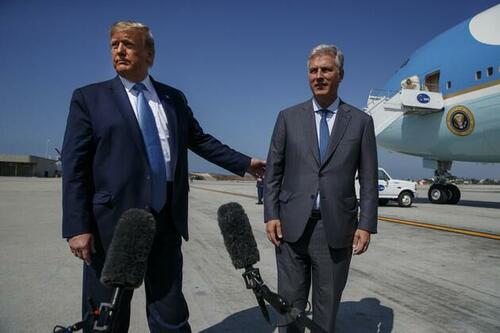By Teeuwe Mevissen, Senior Macro Strategist at Rabobank
Yesterday, news came out that Trump’s last national security advisor Robert O’Brien has written an article that will be published in the next edition of the renowned foreign policy magazine Foreign Affairs. While it is of course not sure that Trump will win the upcoming election – although we still see this as our base case scenario – O’Brien could very well become part of Trump’s administration again.
Indeed, only recently Robert O’Brien said he remains in regular contact with the former president. So what does O’Brien propose according to the news that leaked out yesterday? Perhaps this could be summarized best by quoting O’Brien himself who apparently writes that: “As China seeks to undermine American economic and military strength, Washington should return the favour,”.
But let’s provide a bit more detail. Economically he apparently suggests decoupling from China. Furthermore he ”argues that the 60% tariffs on China that Trump has floated should be only the first step, followed by tougher export controls ’on any technology that might be of use to China‘ and other measures”. Given how interwoven both economies still are and given that we are talking about the two largest economies in the world, it should be clear that such a policy would have a significant impact on the global economy as well.
But it doesn’t end with trade. O’ Brien also proposes a highly assertive, if not aggressive, foreign policy aimed at deterring and containing China in the region. “This morass of American weakness and failure cries out for a Trumpian restoration of peace through strength,” as O’ Brien puts it. He continuous by suggesting to help ”expand the militaries of Indonesia, the Philippines and Vietnam, increase military assistance to Taiwan and boost missile defense and fighter jet protection in the region”.
Last but not least on the military side of things he advocates new underground nuclear testing and the resumption in the US of the production of uranium-235 and plutonium 239 which is used for nuclear warheads. When we add recent remarks from Stoltenberg to dust the West’s nuclear arsenal off and take into account Putin’s tour to North-Korea we might want to return to the life of O’ Brian and look at the bright side of life!
* * *
Meanwhile, US retail sales growth disappointed and even contracted with 0.1% when car sales were not included. Industrial production however rose far more sharply than expected with 0.9% MoM while a rise of 0.3% was expected. Looking at yesterday’s inflation data from the Eurozone there was some good news indeed. While a leap in services inflation had been reported in May and the final measure for headline and core inflation came in unchanged versus the preliminary readings of respectively 2.6% and 2.9%, much of this rise could be attributed to so called one offs, in particular the impact of the Easter holidays.
We also saw that administered cost increases played a significant role. These are costs that are partly or wholly set by governments, municipalities and the like. According to our calculations this contributed some 0.15ppt to the rise in services inflation. The implication of this is that the May inflation numbers were not as bad as they looked. And, stripping this out of the regular core measure and excluding indirect taxes, Eurozone ‘super core’ inflation stayed unchanged in Maty at 2.6% and remains on a (very gentle) downward path. With cost pressures expected to continue to come down gradually, we retain our view of two more ECB rate cuts for this year bringing the deposit rate at 3.25% at the end of this year.
Turning to the UK, there the inflation news out this morning was a little less bright, but enough to keep the faith. In May 2024, the monthly CPI registered at 0.3% m/m, a rate slightly above target. However, the annual rate did see a decline to 2%, thanks to a favourable base effect. A significant factor contributing to the decrease was the food sector, where prices dropped 0.3% m/m this May, contrasting with 0.9% m/m increase in May last year. On the other hand, the transport sector provided the most substantial upward pressure, albeit only partially counterbalancing the overall trend.
Within the realm of services, the decline was driven by recreational and personal services, notably catering, package holidays, and cultural services. This was somewhat mitigated by the costs associated with housing services. With inflation falling to the 2% target, the spotlight shifts to the Bank of England. Our UK watcher Stefan Koopman thinks it’s improbable that interest rates will be cut at tomorrow’s meeting, but the numbers are good enough to make a cut in August still the base case. He also thinks that Rishi Sunak may seize the opportunity to associate himself with this ‘success’ today.
Source link


